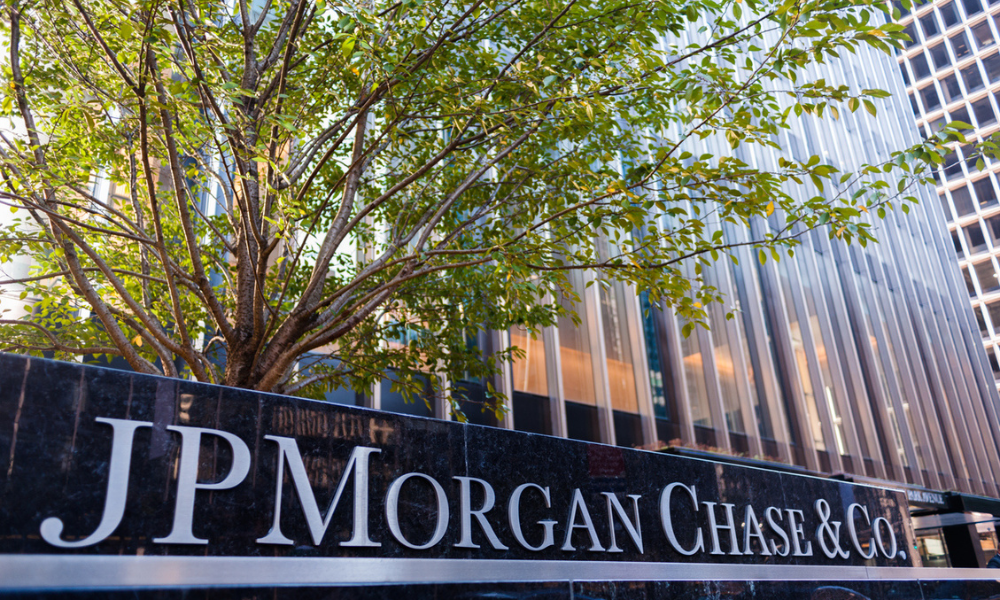

by Hannah Levitt
JPMorgan Chase & Co.’s investment bankers eked out a surprise gain in the second quarter, signaling what may be the start of a dealmaking rebound after widespread hesitation tied to US tariff policies.
Investment-banking fees climbed 7%, the bank said in a statement Tuesday, while analysts were expecting a 14% decline. The firm’s stock traders notched their best second quarter ever, and fixed-income trading trounced expectations.
Dealmaking “activity started slow but gained momentum as market sentiment improved,” Chief Executive Officer Jamie Dimon said in the statement. “The finalization of tax reform and potential deregulation are positive for the economic outlook, however, significant risks persist – including from tariffs and trade uncertainty, worsening geopolitical conditions, high fiscal deficits and elevated asset prices.”
The better-than-expected investment-banking results give a first glimpse into how the Trump administration’s whipsaws on tariffs affected results, as well as new insights into the health of US consumers and businesses. Wells Fargo & Co. and Citigroup Inc. also reported Tuesday, with Bank of America Corp., Goldman Sachs Group Inc. and Morgan Stanley due on Wednesday.
Big banks’ merger-advisory businesses have been a source of concern for many investors, as an expected rebound this year was stymied by conflicting tariff announcements that kept many CEOs on the sidelines, waiting for more clarity. Doug Petno, co-head of JPMorgan’s commercial and investment bank, told investors in May that a lot of clients “tapped the brake” during the volatility.
Shares of JPMorgan, up 20% this year, slipped 0.4% at 9:49 a.m. in New York. Some analysts had predicted the stock might stagnate, even after positive earnings news, because the company’s valuation was already at a high level.
Within investment banking, debt underwriting rose 12% and fees from advising on mergers and acquisitions climbed 8%, both bucking analyst expectations for a decline from a year ago. Equity-underwriting revenue fell 6%, while analysts expected a 29% drop.
On the trading side, the fixed-income business pulled in $5.69 billion, well ahead of the $5.22 billion average estimate. Equity trading came in at $3.25 billion — a second-quarter record following an all-time high set in the first quarter.
JPMorgan’s net interest income in the three months ended June 30 fell short of analyst estimates, though the company said it now sees taking in about $95.5 billion for the full year. At its investor day in May, the bank reaffirmed its earlier full-year NII guidance of about $94.5 billion, but Chief Financial Officer Jeremy Barnum said at the time that the outlook was “probably slightly better than it was at first-quarter earnings.”
JPMorgan and some of its rivals have benefited as interest rates remained relatively high.
Fed Independence
President Donald Trump has repeatedly assailed Fed chair Jerome Powell as the central bank has held off on cutting rates amid concern that tariffs may spur inflation. And in an interview with Bloomberg TV on Tuesday, US Treasury Secretary Scott Bessent suggested Powell should step down from the central bank’s board when his term as chair is up in May 2026.
The Fed’s continued independence is “absolutely critical,” Dimon said on a conference call Tuesday. That just doesn’t mean under Powell, whom Dimon said he respects, but also for whomever eventually succeeds him.
Meddling with the Fed “can often have adverse consequences,” Dimon said.
JPMorgan’s non-interest expenses were $23.8 billion in the quarter, slightly below estimates. Still, the firm said it now expects adjusted expenses, which exclude legal costs, to come in around $95.5 billion for the full year, up from about $95 billion as of May.
JPMorgan added $439 million to its pile of money set aside for potentially soured loans, less than the $761 million analysts expected. In its statement Tuesday, the firm said the build was primarily driven by the impact of lending activity in its wholesale business, “largely offset by a decrease in the weight placed on the adverse scenarios.”
Investors are also keen for insight into how executives are thinking about capital, with a Federal Reserve conference on the topic slated for later this month. JPMorgan and its peers sailed through a relaxed version of the Fed’s annual stress test last month, and days later the bank boosted its dividend and announced its largest buyback program ever.
The central bank also proposed changes to another rule, the enhanced supplemental leverage ratio, late last month.
Copyright Bloomberg News

Three industry leaders will join the hybrid RIA's president and LPL alum, Andy Kalbaugh, to help guide its organic and merger-based growth strategy.

Latest survey shows digital tactics and empowerment top of mind for early-career advisors to be satisfied with their firms.

The co-founder of IFG discussed with InvestmentNews the unique opportunity that remaining independent offers to build a successful firm.

Many are unprepared – and know it – according to a new survey.

Latest mergers and acquisitions reflect continued rise of industry dealmaking.
Orion's Tom Wilson on delivering coordinated, high-touch service in a world where returns alone no longer set you apart.
Barely a decade old, registered index-linked annuities have quickly surged in popularity, thanks to their unique blend of protection and growth potential—an appealing option for investors looking to chart a steadier course through today's choppy market waters, says Myles Lambert, Brighthouse Financial.
